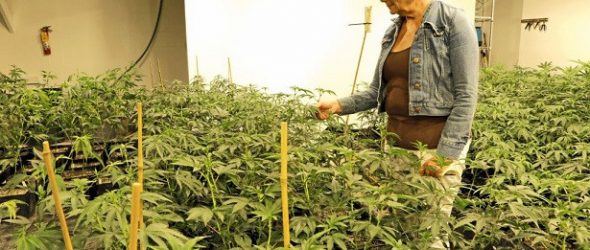UKIAH — Mendocino County announced April 20 an award of more than $2 million dollars from the Governor’s Office of Business and Economic Development.
The award comes after three months of an intensive research collaboration between the county and the California Center for Rural Policy at Humboldt State University, the Humboldt Institute for Interdisciplinary Marijuana Research, the Mendocino Cannabis Alliance, Origins Council and cannabis attorney Hannah Nelson.
Nelson is founder of the California Cannabis Compliance Alliance and has worked extensively with local and federal authorities to protect growers and consumers from the enforcement of unclear and frequently changing cannabis policy.
Supervisor Ted Williams led the County’s participation in the collaboration, working with Mendocino’s Planning and Building Services Department. Williams was elected 5th District Supervisor in 2018.
The group collaborated on a Mendocino County Equity Assessment, and its results showed that the war on drugs and prohibition of cannabis had disproportionately impacted the residents and businesses in the county, compared to elsewhere in the state.
The assessment also aimed to identify neighborhoods and small growers that may have been left behind in recent legalization and by past policy.
The collaboration’s purpose was to show that a well-funded local equity program would be an effective way to relieve county residents from disproportionate legal and financial consequences, especially in the face of recent marijuana decriminalization.
The funding comes from the Governor’s Office of Business and Economic Development, and the program administration funding cannot exceed 10 percent of the $2,242,704 awarded. This leaves more than $2 million for qualifying county businesses and residents. Mendocino County’s Planning and Building Department said it aims to have an agreement with the Governor’s office for the equity fund by the end of June 2020. The funding begins fiscal year 2020-2021, which typically begins in July.
Supervisor John McCowen, 2nd District County Supervisor since 2009, provided the County’s history in cannabis programs and policy that was needed to complete the grant application.
“Our legacy cannabis businesses were already struggling with the high cost and complexity of entering the legal market, so these equity funds are needed now more than ever,” McCowen said of the award.
Transitioning into compliance with new marijuana legislation has been confusing and expensive for many cannabis industry businesses statewide, and the county sought state funding to assist its local, small scale businesses navigate applications and compliance with the same resources that are easily afforded to larger operations.
In January 2019, McCowen helped form the Cannabis Ad Hoc Committee, along with fellow Mendocino County Board Supervisor John Haschak. The committee’s purpose was to analyze with the community how new cannabis cultivation ordinances affected them, and to find possible revisions to present to the Board based on those local needs.
Funding provided by the grant program can be used by local cannabis businesses for application and small business development assistance, supplementing tiered or waived fees for applications and permits, employment training, and deferral of application fees for administrative and use permits.
The funding also provides loans and grants for regulatory compliance, which helps cannabis growers with the cost of managing the environmental impact of their production.
Mendocino’s Building and Planning Services Department is expected to announce more information about the program’s implementation in June, including more on the qualifications needed to participate.
Some the of the criteria that will help determine eligibility to participate include cannabis businesses located in communities with more than a 20 percent poverty rate, minority populations, those experiencing homelessness because of past cannabis enforcement, small scale cultivators, cultivators who have experienced asset forfeiture, exploitation, or violence as a result of participating in the since decriminalized cannabis industry.
There are at least seven dispensaries operating in Mendocino County, most of which are operating their full, regular business hours even in light of COVID-19 social distancing policies and global shutdowns of most nonessential business.
Marijuana dispensaries are considered an essential business in California and several other states, like Michigan and New York. This is most likely to support medical marijuana consumers, even though recreational consumers are not being turned away.
Delivery services are also still operating, and storefront locations like Herban Legend, Dragonfly Wellness Center, and Sol de Mendocino in Fort Bragg were operating normally, in some cases with limited staff.
As the Equity Program is still being developed, Mendocino Building and Planning Services will have more information available about the different uses for the funds and who will qualify for them throughout the summer.




